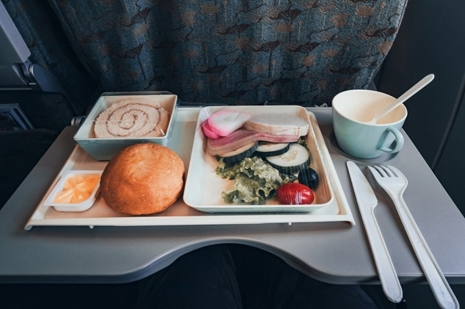
A discussion with Daniela Stange, Manager, Sustainability at IATA
IATA recently released the Reassessing Single Use Plastics Products in the Airline Sector report (pdf) to assist airlines, regulators, and the airline supply chain to mitigate the environmental impacts of single-use plastic products (SUPP).
In 2022, 170 nations pledged to significantly reduce the use of plastics by 2030 at the United Nations Environment Assembly (UNEA) and a resolution was adopted to develop an international legally binding instrument on plastic pollution, including in the marine environment.
In the context of the negotiations to elaborate this Plastics Treaty and the negotiations to be completed by the end of 2024, this report provides visibility to the challenges faced by the air transport industry and shows the progress and commitment that airlines have made towards a more cohesive approach to SUPP reduction.
It remains crucial to enable ccollaborative actions from the entire air transport value chain and enhance cooperation between sectors, so that our industry can contribute further to a circular economy.
Could you give us some background on plastic pollution?
The impacts of plastic pollution can be seen along the entire plastic life cycle. From exposure to chemicals, plastic particles, and additives used in the production phase, leakage of mismanaged plastic that turns into macro and microplastics contributing to air pollution and affecting the marine environment and people’s health, to the contribution to climate change from plastic production and conversion from fossil fuels.
According to the Organisation for Economic Co-operation and Development (OECD), 430 million metric tonnes of plastic are produced each year, with over one-third being discarded after only one use. Only 10% of plastic is recycled globally, and the remainder is either burned—causing air pollution—or dumped in the open, of which around 2% ultimately ends up in the ocean.
Plastic now comprises an estimated 85% of total marine waste. SUPP, designed to be discarded after just one use, are the focus of increasing public concern and regulatory action. The inappropriate disposal of SUPP represents a major risk to ecosystems as they decompose very slowly and break into microplastics, which can damage sea life and enter the marine food chain, posing significant threats to wildlife, and human health.
Why a focus on SUPP in aviation?
The SUPP used throughout the aviation value chain, which have played an important role in the delivery of the passenger experience and cargo operations for decades, are under scrutiny as concerns continue to grow.
SUPP are widely used in aviation due to their strength, lightness, and ability to meet safety and security regulations. Nevertheless, cabin waste composition audits conducted in 2013-2014 and in 2018 found that plastic accounted for 17%–20% by weight. Although polyethylene terephthalate (PET) bottles are a highly visible SUPP, they only account for 2% of the waste. Moreover, airline operations are required to use certain SUPP by civil aviation authorities’ regulations seeking to ensure safety and security.
However, the airline sector faces challenges associated with improved cabin waste performance and the replacement of SUPP with sustainable alternatives. In addition, airlines face technical and operational obstacles, and the lack of harmonized and risk-based regulations presents a significant barrier to improving recycling and circularity of waste management. The absence of smart regulation continues to constrain airline efforts to improve the sustainability of cabin operations.
In addition, the IATA passenger insights survey conducted in November 2023 showed that more than three quarters of passengers would feel better about flying if it did not involve any SUPP, and that they would be happy to support fewer food and beverage options so that airlines could achieve this. The IATA Shipper Survey 2022 showed that 50% of cargo customers include waste reduction along the supply chain among their top priorities and cargo operators are receiving requests from end customers to reduce the associated plastic packaging and wrapping.
What is the purpose of the report? And what does it cover?
This report is designed to provide recommendations for airlines, regulators, and other aviation stakeholders about the unique situation faced by the global airline industry regarding the replacement of SUPP with sustainable alternatives. It formulates strategic and practical suggestions for private and public sector to reduce unnecessary and problematic SUPP, to divert reusable and recyclable SUPP from landfills and incineration, and to implement more circular models into the airline value chain.
The report covers the following:
What are the main recommendations?
The report advocates for a sectoral approach to managing SUPP in aviation with a clear set of recommendations. Key recommendations include:
For airlines:
For regulators:
For the supply chain:
> Download the Reassessing Single Use Plastics Products in the Airline Sector report (pdf)